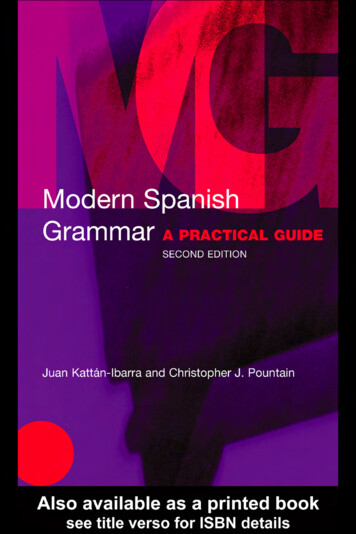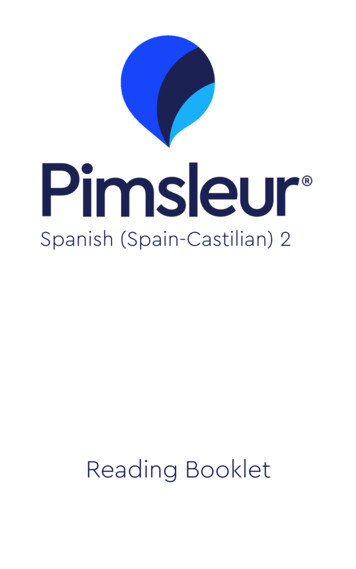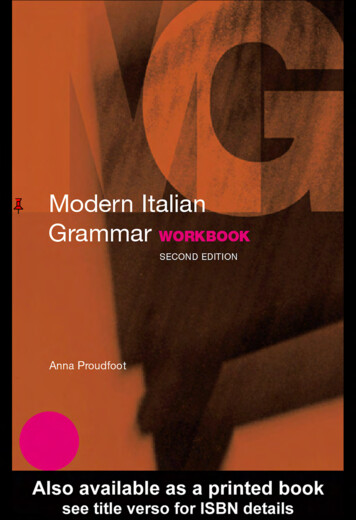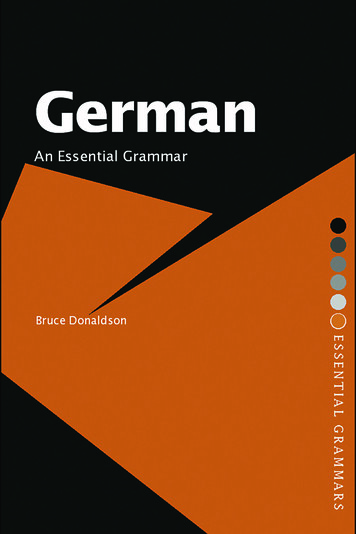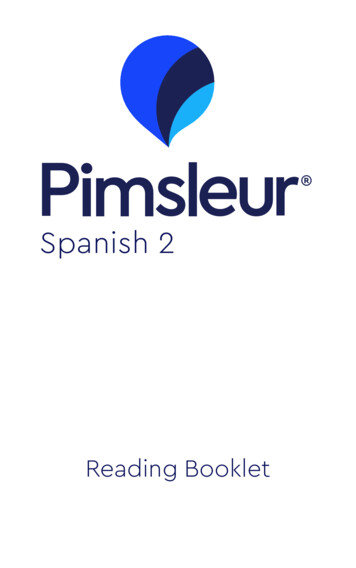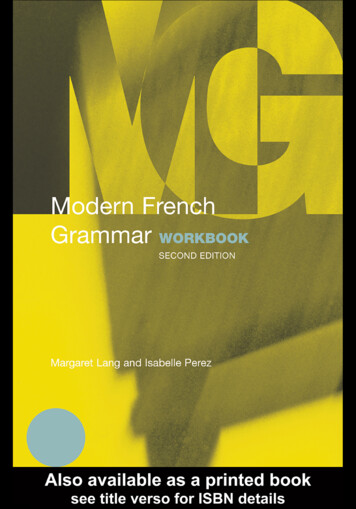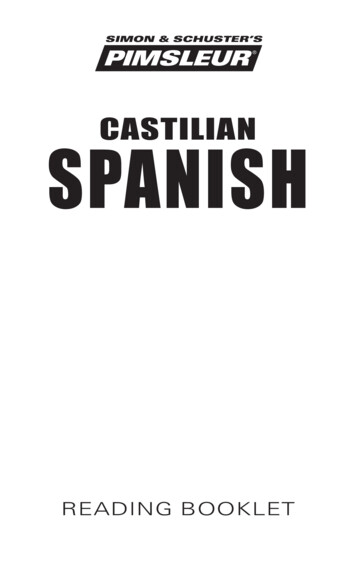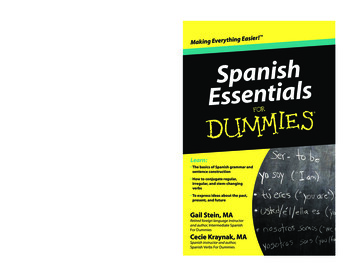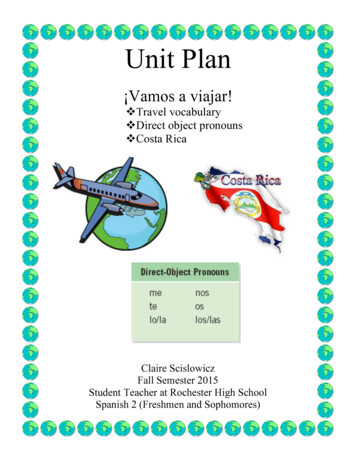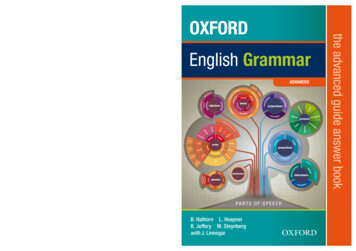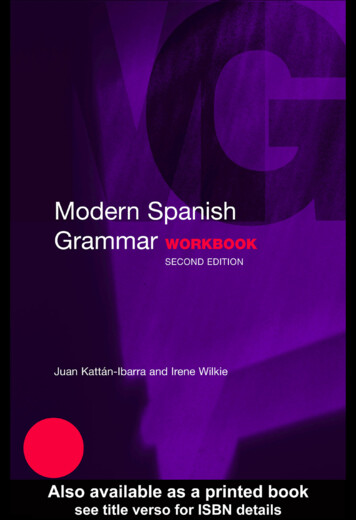
Transcription
ModernSPANISHGrammarWORKBOOKSecond Edition
Routledge Modern GrammarsSeries concept and development – Sarah ButlerOther books in the series:Modern Spanish Grammar, Second Edition by Juan Kattán-Ibarra and Chris PountainISBN: HB 041527303X; PB 0415273048Modern French GrammarModern German Grammar, Second EditionModern Italian GrammarModern French Grammar WorkbookModern German Grammar Workbook, Second EditionModern Italian Grammar Workbook
ModernSPANISHGrammarWORKBOOKSecond EditionJuan Kattán-Ibarraand Irene Wilkie
First published 1997by RoutledgeThis edition first published in 2003by Routledge11 New Fetter Lane, London EC4P 4EESimultaneously published in the USA and Canadaby Routledge29 West 35th Street, New York, NY 10001Routledge is an imprint of the Taylor & Francis GroupThis edition published in the Taylor & Francis e-Library, 2005.“To purchase your own copy of this or any of Taylor & Francis or Routledge’scollection of thousands of eBooks please go to www.eBookstore.tandf.co.uk.” 1997 Juan Kattán-Ibarra 2003 Juan Kattán-Ibarra and Irene WilkieTJ International Ltd, Padstow, CornwallAll rights reserved. No part of this book may be reprinted orreproduced or utilised in any form or by any electronic,mechanical, or other means, now known or hereafterinvented, including photocopying and recording, or in anyinformation storage or retrieval system, without permission inwriting from the publishers.British Library Cataloguing in Publication DataA catalogue record for this book is available from the British LibraryLibrary of Congress Cataloging in Publication DataA catalog record for this book is available from the Library of CongressISBN 0-203-42834-X Master e-book ISBNISBN 0-203-44035-8 (Adobe eReader Format)ISBN 0–415–27306–4 (Print Edition)
n checklistsvii13Part 1 Structures11Part 2 Functions47Answer keyCross-references to Modern Spanish GrammarWorkbook evaluation questionnaireIndex of grammar structuresIndex of functionsv123158163164166
AcknowledgementsThe authors would like to express their thanks to Christopher J. Pountain of Queens’College Cambridge for his valuable collaboration in the production of the first versionof this workbook.vii
IntroductionModern Spanish Grammar Workbook, Second Edition, like its companion volumeModern Spanish Grammar, Second Edition is divided into two parts: Structures andFunctions.The Structures section provides practical exercises on the basic grammar of Spanish, andit will be a good idea to work from this section if you can identify specific points onwhich you need practice (e.g. the subjunctive, agreements, use of verb forms, etc.).You will find some self-evaluation pages to help you to do this.The Functions section is organized according to language use in particular situations.Here you can practise not only the associated grammatical structures, but also setphrases and ways of doing things, such as apologizing, describing a person, asking theway, and so on.The two sections inevitably overlap to a certain extent, although the nature of theexercises in the two parts is generally different. You will find cross-references betweenexercises which deal with similar points or similar uses of language. The Workbookcontains exercises at all levels and aims to be comprehensive in its coverage of the basicstructures of the language. A full key is provided at the end of the book.The Workbook has been designed to be used independently or as a complement toModern Spanish Grammar and full cross-referencing to the Grammar is provided at theend of the book. You should consult the Grammar for the elucidation of any difficultiesyou encounter in working through the exercises: in this way the Workbook can be usedsuccessfully for private study as well as being a convenient resource for taught courses.Exercises have been graded on a 3-point scale as follows: easy exercises with basic vocabulary which require little or no manipulationslightly more difficult exercises which may contain more complex vocabularyand/or require some degree of manipulation more complex exercises using wider vocabulary and requiring grammaticalmanipulation.1
Self-evaluation checklistsSelf-evaluation checklist 1Units 1–10How confident are you that you understand the points listed below?Be honest with yourself. If you are not sure, refer to the relevant chapter in the grammarbook and revise the point in question.Your performance on the exercises in the Workbook should give you an indication ofwhat you need to revise.Veryconfidentrules of pronunciationspellinguse of capital lettersgender agreementspluralagreement of adjectivesuse of definite articleuse of indefinite articleshortening of adjectivesposition of adjectivescomparatives of adjectives andadverbscardinal numbersordinal numberssubject pronounsobject entA littleunsureNot at allconfident
SELF-EVALUATION CHECKLISTSSelf-evaluation checklist 2Units 11–17How confident are you that you understand the points listed below?Be honest with yourself. If you are not sure, refer to the relevant chapter in the grammarbook and revise the point in question.Your performance on the exercises in the Workbook should give you an indication ofwhat you need to revise.Veryconfidentuse of que, el cual, quien andcuyointerrogatives and exclamationsindefinite pronounsand adjectivesnegative pronounsand adjectivesformation ofadjectivesnegativespresent, perfectand preterite ofregular verbsfuture andconditional ofregular verbssubjunctive tensesimperativescompound tensesirregular preteritesirregular futuresand conditionalsirregular pastparticiplesirregularimperativesuse of all verbforms4ReasonablyconfidentA littleunsureNot at allconfident
Self-evaluation checklist 3Self-evaluation checklist 3Units 18–20How confident are you that you understand the points listed below?Be honest with yourself. If you are not sure, refer to the relevant chapter in the grammarbook and revise the point in question.Your performance on the exercises in the Workbook should give you an indication ofwhat you need to revise.Veryconfidentsubjunctive withverbs of influencesubjunctive with expressions ofhopingsubjunctive with expressions ofemotionsubjunctive with expressions ofthinkingsubjunctive with expressions ofpossibility etc.subjunctive after conjunctionssubjunctive in conditionalclausessubjunctive inrelative clausessequence of tenses in reportedspeechestar gerundacabar deir a infinitivellevar gerundir and venir gerundtener pastparticiple5ReasonablyconfidentA littleunsureNot at allconfident
SELF-EVALUATION CHECKLISTSSelf-evaluation checklist 4Units 21–28How confident are you that you understand the points listed below?Be honest with yourself. If you are not sure, refer to the relevant chapter in the grammarbook and revise the point in question.Your performance on the exercises in the Workbook should give you an indication ofwhat you need to revise.Veryconfidentmodal verbs(poder, saber,tener que, etc.)ser and estarreflexive verbsimpersonalreflexivepassive reflexiveser past participleestar pastparticipleindefinitesubjectsuse ofprepositionspor and parainfinitive assubjectinfinitive asobjectgerund complementationcoordinating conjunctionssubordinating conjunctionsword order6ReasonablyconfidentA littleunsureNot at allconfident
Self-evaluation checklist 5Self-evaluation checklist 5Units 29–34How confident are you that you understand the points listed below?Be honest with yourself. If you are not sure, refer to the relevant chapter in the grammarbook and revise the point in question.Your performance on the exercises in the Workbook should give you an indication ofwhat you need to revise.Veryconfidentgreeting someoneintroducing someonetaking leaveexpressing wishescongratulatingsomeoneusing the phonesetting out a letterattracting attentionasking for repetitionapologizinginterruptingdeveloping a topicasking questionsnegatingusing indirect speechasking for and giving personalinformation7ReasonablyconfidentA littleunsureNot at allconfident
SELF-EVALUATION CHECKLISTSSelf-evaluation checklist 6Units 35–47How confident are you that you understand the points listed below?Be honest with yourself. If you are not sure, refer to the relevant chapter in the grammarbook and revise the point in question.Your performance on the exercises in the Workbook should give you an indication ofwhat you need to revise.Veryconfidentidentifying people and placesdescribing people and placesasking questions about peopleand placesdescribing events (ser or estar?)making comparisonshaber or estar?expressing location anddistanceasking about locationexpressing ownershipexpressing changes (ponerse,hacerse, etc.)saber or conocer?remembering and forgettingexpressing obligation and dutyexpressing needs8ReasonablyconfidentA littleunsureNot at allconfident
Self-evaluation checklist 7Self-evaluation checklist 7Units 48–59How confident are you that you understand the points listed below?Be honest with yourself. If you are not sure, refer to the relevant chapter in the grammarbook and revise the point in question.Your performance on the exercises in the Workbook should give you an indication ofwhat you need to revise.Veryconfidentexpressing possibility andprobabilityexpressing certainty anduncertaintyexpressing suppositionexpressing conditionsexpressing contrast (sinembargo, aunque, etc.)expressing capability (poderor saber?)asking and giving permissionasking and giving opinionsexpressing agreement anddisagreementexpressing desires andpreferencesexpressing likes and dislikesexpressing surprise9ReasonablyconfidentA littleunsureNot at allconfident
SELF-EVALUATION CHECKLISTSSelf-evaluation checklist 8Units 60–73How confident are you that you understand the points listed below?Be honest with yourself. If you are not sure, refer to the relevant chapter in the grammarbook and revise the point in question.Your performance on the exercises in the Workbook should give you an indication ofwhat you need to revise.Veryconfidentexpressing satisfaction anddissatisfactionenquiring about satisfactionand dissatisfactionexpressing approval anddisapprovalexpressing hopeexpressing sympathyapologizing and expressingforgivenessexpressing fear or worryexpressing and responding togratitudegiving advicemaking suggestionsmaking requestsgiving directions andinstructionsmaking an offer or invitationaccepting or declining an offertalking about the presenttalking about the futuretalking about the past10ReasonablyconfidentA littleunsureNot at allconfident
1StructuresPronunciation and spelling11 You are phoning a Spanish colleague to tell him/her the names of the people whowill be accompanying you on a business trip to Madrid. How would you spell thefollowing?(a) James Stockton(b) Karen Johnson(c) Christopher Watson2 (d) Gerry Dixon(e) Jean Davidson(f) Elizabeth MacQueenDaniel wrote the following letter to María but his computer didn’t have accents. Canyou put them in?Querida Maria:¡Hola! ¿Como estas? El sabado recibi tu carta, en la que me dices quevendras a pasar unos dias aqui. ¡Que buena noticia! ¡No sabes cuantome alegro! ¿Que dia y a que hora llegaras?Yo tomare vacaciones a partir de la proxima semana, asi que estarelibre para salir contigo. Podriamos pasar unos dias en la playa. ¿Quete parece? Nicolas me ofrecio su casa. ¿Te acuerdas de el? Es el chicoque viajo conmigo a Sudamerica el año pasado.Escribeme en cuanto este lista tu reserva, o bien llamame portelefono al numero 675 2846. Me gustaria ir a buscarte al aeropuerto. Un abrazo. Daniel3 Place a written accent on the words in italics where appropriate.(a)(b)(c)(d)(e)(f)(g)(h)4 No he tenido noticias de el desde el verano pasado.Para mi, mi trabajo y mi familia son lo más importante.Se que se llama Antonio, pero no se cómo se apellida.Les pregunté si querían acompañarnos y dijeron que si.Era solo un niño cuando murió su madre y se quedó muy solo.Hay un solo problema. Solo Luis sabe dónde está la llave.Tu teléfono no funciona. ¿Sabes tu qué le pasa?Le pregunté cuando me lo entregaría y dijo que llamaría cuando estuviera listo.Correct the following sentences. (Some words have capital letters which should nothave them and some do not have them where they should.)(a) Me gusta ir de compras los Sábados.11
2STRUCTURES(b)(c)(d)(e)Gender and gender agreement21‘La Vida Es Sueño’ es una obra estupenda.Vas de vacaciones con Los pérez ¿verdad?Mi madre es Francesa.La mayoría de los Españoles son católicos, pero Los Rodríguez son Protestantes. Fill in the blanks with the following adjectives establishing appropriate genderagreement between these and the nouns they (h)2 rojorápido.El agua del río estaba sumamente¡Qué comida más!¡Qué problema más!La policía actuará con manocontra los delincuentes.Carlos es un artista.Su moto es muy.Ésta es sufoto. El niño tenía un mes cuando la tomé.Olvidé mi pijamaen el hotel.Los jugadores están. (feliz)A mi hermana mayor no le gusta madrugar, es muy. (dormilón)Mis compañeras de clase son un poco. (hablador)Es mejor no viajar en las horas. (punta)Los otros viajeros eran. (israelí)¡Quées la niña! (pequeñina)el capital – la capitalel corte – la corteel cura – la curael frente – la frenteel guía – la guíael manzano – la manzana(g)(h)(i)(j)(k)(l)el margen – la margenel naranjo – la naranjael orden – la ordenel partido – la partidael pendiente – la pendienteel policía – la policíaGive the feminine equivalent of the following words.(a)(b)(c)(d)(e)(f)12fríoExplain the difference in meaning between the following pairs of words.(a)(b)(c)(d)(e)(f)4consumadoFill in the blanks with the correct form of the adjective given in brackets.(a)(b)(c)(d)(e)(f)3deliciosoel actorel alcaldeel caballoel cantanteel dentistael estudiante(g)(h)(i)(j)(k)(l)el jovenel príncipeel profesorel reyel varónel yerno
4The articles5 You are writing to a Spanish friend trying to convince him/her to visit London for aholiday. How would you say the following? (You should use the neuter lo in eachsentence.)(a)(b)(c)(d)(e)Plurals and number agreements31 Give the plural of the following words.(a)(b)(c)(d)(e)(f)(g)2The good thing about London in spring is that it is not too hot.Although last year it rained a lot, which surprised me.You can’t imagine how beautiful the parks are!As far as travelling is concerned, the best thing is to take the undergound.The worst thing, without doubt, is travelling by car. el aguael carácterespañolel el lápizel lunesel ordenadorel origenel paraguasel régimenel reyFill in the blanks with the following adjectives, establishing appropriate agreementwith the nouns they biertopococortofríocastañodisponibleprimero(1) vez. Era un(2) día de inviernoAún recuerdo el día en que vi a Ana por(3) café de la Plaza Mayor. Se dirigió a paso(4)y yo estaba sentado en un(5) mesas(6), eligiendo una junto a una ventanahacia una de las(7). Su tez(8) y su pelo(9) contrastaban con su falda y zapatos(10). Algunos parroquianos la miraban con(11) curiosidad y atención.3 Correct the mistakes in the following sentences (one per sentence).(a)(b)(c)(d)(e)(f)The articles41Los menúes estaban en la mesa.Los jovenes fueron al cine.Habían cien personas en la reunión.Los régimenes no sirven para nada.Pusieron los altavozes justo delante de nosotros.Me regaló un traje muy bonito – un pantalón y una chaqueta rojo. Fill in the blanks with a definite article, where appropriate, including the neuter formlo.(a) ¿Qué es13felicidad?
e es que te sientas bien.negro no te sienta.Habloinglés yfrancés, peroinglés me resulta más fácil.mejor de Madrid son sus cafés.que sea mi jefa no le da derecho a hablarme así.¡No sabesguapa que te ves!hambre ha llevado a muchos a emigrar.No suelo bebercafé. Prefieroté.bueno de mi trabajo es que tengo largas vacaciones.Enverano suelen ir a San Sebastián, peroverano pasado fueron aIbiza.(l)España de la transición vivió momentos convulsionados.2 Fill in the blanks in this passage with definite articles, where appropriate, including theneuter form lo.(1) rápida acción de(2) policía desbarató(3) plan de(4)(5) casa a través de(6) puerta trasera.ladrones que intentaban ingresar en(7) arma arrebatada a uno de ellos ayudará a(8) identificación(9) malhechores.(10) hecho, ocurrido ayer(11) lunesde(12) tarde mientras(13) ocupantes de(14) número 54por(15) calle Benavente se encontraban fuera de(16) ciudad,de(17) alarma entre(18) habitantes de este tranquilo barrio. Segúncausó(19) jefe policial,(20) aumento de(21) delincuenciamanifestó(22) que más preocupa a(23) vecinos de(24) barrio Bellavista.es3 Fill in the blanks in this passage with an indefinite article where necessary.Margarita Durán es(1) licenciada en lengua y civilización españolas y trabaja(2) profesora en(3) escuela de idiomas. Margarita no tienecomo(4) casa y vive con(5) amigos en(6) viejo piso de la calle de(7) coche, viaja hasta la escuela en(8) autobús.Velázquez. Como no tiene(9) excelente nadadora y por la tarde toma(10)Margarita es también(11) polideportivo que está a(12) media hora de la escuela.autobús hasta(13) otra nadadora, que es(14) amiga de Margarita, suele llevarlaCarmen,en coche hasta su casa.4 You are writing a postcard to a Spanish friend telling him/her about your holiday inPeru. How would you say the following?(a)(b)(c)(d)(e)(f)We arrived in Peru on Tuesday.I don’t like the hotel very muchalthough it has a certain charm.The food is quite good, but I prefer Spanish food.The fact that we are the only English people here surprises me.It is fortunate that I speak Spanish because I can translate into English what theguide says.(g) There are French tourists from Paris and Bordeaux in our group – those from Parishate the food.14
5AdjectivesAdjectives51 Fill in the blanks in this dialogue with the correct form of the following ce usted(1)(2) hotel por aquí?–Por aquí no hay(3) hotel, pero en la calle de(4) Juan hay dos o tres. Siga(5) semáforo y gire a la izquierda. Allí verá el hotelusted todo derecho hasta el(6). Se lo recomiendo.del Pinar. Es un hotel muy–¿Y hay(7) farmacia por aquí?–No, por aquí no hay(8) farmacia, pero seguramente en la plaza de(9)(10) Juan.Ana encontrará una. Está al final de la calle de2 Put the adjectives in brackets in the correct form and most appropriate order withineach sentence.(a) La línea vuela a todas partes del mundo. (británico/aéreo)(b) Los estudiantes están asustadísimos con el examen. El profesor es muy estricto.(pobre)(c) El dinero fue hallado al fondo de una caverna. (oscuro)(d) Aquel día Antonia llevaba un hermoso vestido. (rojo)(e) El terremoto no dejó ni una casa en pie. (solo)(f) Ha tenido grandes dificultades. (económico)(g) El atraco ocurrió en una calle en el centro de la ciudad. (peatonal)(h) La familias recibirán ayuda económica del gobierno. (pobre)(i) ¡Qué porvenir le espera a Nicolás! (negro)(j) Todavía quedan problemas por resolver. (numeroso)3 Explain the difference in meaning between the adjectives in italics in the followingpairs of sentences.(a) La antigua capital de Guatemala era Antigua.Es la iglesia más antigua de la ciudad.(b) María tiene un cierto encanto. ¿No crees tú?Es cierto. A mí también me encanta.(c) Él tiene una versión distinta de los hechos.Consultó distintos médicos, pero ninguno pudo curarla.(d) Es un hotel grande y moderno.Fue un gran error habérselo dicho.(e) Compró un coche nuevo.Compró un nuevo coche.(f) Laura es única.Laura es su única hija.(g) La respuesta es simple.Fue una simple coincidencia.(h) El aire puro te hará bien.Es la pura verdad.15
6STRUCTURES4 Translate the following sentences into Spanish, being particularly careful to choose themost appropriate position for the adjective in each case.(a)(b)(c)(d)(e)(f)(g)(h)Comparative and superlative forms of adjectives and adverbs61I am not going to any more of his boring lectures!Red wine is better for your health than white wine.I prefer sweet-smelling flowers.Thank you for the sweet-smelling flowers which you sent me.I love to see the white snow falling on the trees.This damned computer is not working properly.Who is that little man sitting in the corner?The little man next door lent me a corkscrew. Martín wants to study English and has made the following notes about two schools.Use the information in the box to complete the sentences below, comparing each ofthe features listed by Martín. Use expressions like más/menos . . . que, tan . . . como,tanto . . . como, as appropriate.The first sentence has been done for you.AntigüedadDistancia al metroInscripciónAlumnos por grupoNo de horas por semanaHorarioInstalacionesImpresión generalEscuela CentralInstituto Pax25 años5 minutos80 euros12209.00–13.00buenasbuena4 años5 minutos120 e)(f)La Escuela Central es más antigua que el Instituto Pax.La Escuela Central estácerca del metroel Instituto Pax.La Escuela Central esbaratael Instituto Pax.La Escuela Central tienealumnos por grupoel Instituto Pax.El Instituto Pax tienehoras de clase por semanala Escuela Central.Las clases en la Escuela Central empiezantempranoen el InstitutoPax.(g) La Escuela Central tieneinstalacionesel Instituto Pax.(h) Tengo la impresión de que la Escuela esel Instituto Pax.2 Cristina is not too happy about the way Aurora has been describing some mutualfriends. Make Aurora’s sentences less categoric by rephrasing them using tancomo.P. ej.:Carlos es más aburrido que Julián. Carlos no es tan interesante como Julián.16
7Numbers(a)(b)(c)(d)(e)(f)(g)(h)3 Carlos es más perezoso que Julián.Elena es más gorda que Isabel.Luis es más lento que Francisca.Pedro es más feo que Miguel.Gabriel es más avaro que su padre.Leonor es mayor que Julia.Daniel y Carmen son más desordenados que sus hermanos.Paco y Pepe son más irresponsables que Pablo.Use the adjectives in brackets or one of their forms to make up questions and thenanswer them accordingly.P. ej.:¿(importante) ciudad de Estados Unidos? ¿Cuál es la ciudad más importante de Estados Unidos? La ciudad más importante es Nueva York.(a)(b)(c)(d)(e)(f)(g)(h)4 ¿(grande) ciudad de Gran Bretaña?¿(rápido) forma de viajar?¿(barato) medio de transporte?¿(alto) monte del mundo?¿(frío) meses del año?¿(bueno) época del año para visitar tu país?¿(bueno) tu virtud como persona?¿(malo) tu defecto como persona?Translate the following sentences into Spanish.(a)(b)(c)(d)Although Paris is the most romantic city in the world, personally I prefer Prague.Prague is more interesting from the architectural point of viewand it has as many historical monuments as Paris – if not more.The public transport system may be better in Paris, but there are fewer cars on thestreets in Prague.(e) The best thing about Prague is its inhabitants – they are more open and friendlythan the Parisians.Numbers71 Read and then write the following figures in 957(i)(j)(k)(l)(m)(n)(o)(p)1.2312.579US 11.651US 50.010 105.934 pesos 1.549.001 pesos3.032.7128.999.205
8STRUCTURES2 Read the following names.(a) Juan Carlos I(b) Alfonso X(c) Alfonso XIII3 Read the following times.(a) 5.15(b) 7.30(c) 9.254 Replace the words in italics by an appropriate object pronoun, making other changeswhere necessary. More than one position is possible in some cases.(a)(b)(c)(d)(e)(f) Envié dos postales a mis padres desde Venezuela.Recibieron las postales después de mi llegada.Traje un hermoso regalo para Mafalda.He comprado algo para ti y Nicolás.Voy a llamar a Antonia para saludarla.Estoy buscando su dirección.Replace the words in italics with two object pronouns – one direct and one indirect.More than one position is possible in some cases.(a)(b)(c)(d)(e)3¿Cuál es la fecha del día de Navidad?¿En qué año murió Franco?¿Cuál es la fecha del Día de los Trabajadores?¿En qué año descubrió Colón el Nuevo Mundo?Personal pronouns82(d) el siglo VII(e) el siglo XIX(f) el siglo XXIAnswer the following questions. Write the dates as words.(a)(b)(c)(d)1(d) 10.30(e) 11.40(f) 12.00Read the following dates.(a) 12.10.1492(b) 19.1.1911(c) 14.4.19315(d) Isabel II de Inglaterra(e) Enrique VIII(f) Juan Pablo IICompré un regalo para mi madre en Madrid.Mis hermanos enviaron las postales a sus amigos.Estoy buscando la casa ideal para mi novio y yo.El jefe quiere que Carmen dé la noticia a los clientes cuanto antes.El profesor cree que los padres están haciendo los deberes para sus hijos.Fill in each of the blanks with an appropriate personal pronoun, making other changeswhere necessary.(a) Váyanse ustedes al hotel Carrera.recomiendo.(b) Si quieres la dirección de Nori,daré en seguida.(c) Nodijimos al abuelo lo sucedido. Nopareció prudente, aunque élsospechaba.18
Personal pronouns8(d)(e)(f)(g)(h)Hice todo lo quepedisteis.aseguro.No puedo encontrar la avería. Estoy tratando de localizar.Si ves a Miguel y Juan Carlos di que llamen. Tengo algo que decirQuiero la sal. Pása, por favor.No queríamos que Julio se enterara. Tratamos de ocultár, pero nologramos.(i) Perdóname, perocayeron tus gafas yrompieron.compraré otras.(j) Disculpa que no te haya traído tu dinero.olvidó.4 Alter the position of the pronouns in italics where possible.(a)(b)(c)(d)(e)(f)(g)(h)5 ¿Vas a contárselo a Sara?¡Cómo podría decirle una cosa así!Nos lo tenéis que devolver cuanto antes.Te he dicho que me lo traigas. Quiero leerlo.Tráemelo mañana mismo.Se lo vengo diciendo desde hace mucho tiempo, pero no me hace caso.Estoy terminándola. Si vuelves a interrumpirme te vas de aquí.Acabamos de comprarlos, pero los pensamos vender lo antes posible.Fill in the blanks in this dialogue with the most appropriate pronouns.En una tiendadependienta: Buenas tardes señora, ¿qué desea?(1) enseña ese vestido que está en elclienta:Por favor, ¿escaparate?dependienta: Un momentito, por favor.(2)(3) enseño en seguida.(4) prefiere en este mismo color?¿clienta:Sí, ese color(5) gusta mucho.dependienta: También(6) tenemos en rojo y en azul.clienta:No,(7) prefiero en negro.dependienta: A(8) también(9) gusta el negro.(10) encuentromás elegante.clienta:Sí, claro. ¿Puedo probár(11)(12)?dependienta: Sí, por supuesto, el probador está al fondo. (La clienta(13)(14) queda?prueba el vestido.) ¿Cómoclienta:(15) queda muy bien.(16) voy a llevar.6 Translate Soledad’s letter to her friends Marisol and José:Hi Marisol and José,I am writing to you to give you a piece of good news. Fernando and I are going to get married! Lastnight we went for a walk in the park after dining in a restaurant in the Paseo Marítimo, and he said tome ‘Let’s sit down here a while, I want to ask you a question.’ We sat down and he asked me ‘Will youmarry me?’ I couldn’t believe it! Of course I said yes.Then he said ‘We must tell your parents straight away – let’s go!’. We told them and they weredelighted.19
10STRUCTURESWe are going to get married in June, and we will live in Málaga. I will let you know the exact date assoon as we have decided.Write to me soon,Love,SoledadDemonstratives9 1Fill in each blank in these dialogues with este or ese, establishing gender and numberagreement as appropriate.(a) –Perdone, ¿cuál es la oficina de la señora Ríos?–Es, la que está al final del pasillo.(b) –Perdone, ¿es(1) la oficina de la señora Ríos?–Sí, es(2). Pase usted.(3) cartas y(4) documentos para ella.–TraigoAquí tiene.–Gracias.–¿Quiere firmar(5) recibo, por favor?–Sí, por supuesto. 2Fill in each blank in this dialogue with ese or one of its forms.–¿Cuánto valen(1) pantalones que están en el escaparate?–¿Cuáles?–(2), los negros, los que están al lado de(3) camisas de cuadros.–(4) los tenemos de oferta a 40 euros.–Y(5) chaqueta, ¿cuánto cuesta?–(6) vale 60 euros. 3Victoria has returned to her home town after many years and she describes the town toa friend. Fill in each blank with este, ese, aquel, or one of their forms. More than onealternative is possible in some cases.(1) tiempo yo vivía en las afuerasMira, yo me fui de aquí en el año 1950 y en(2) esquina, donde estamos ahora, había una tienda, y endel pueblo. En(3) otra esquina, al otro lado de la calle, había un bar. En(4) años(5) pueblo.(6) no era más que unprácticamente no llegaban turistas a(7) colina?pequeño pueblo de pescadores. ¿Ves la iglesia que está allá lejos enPues, allí estaba el único hotel del pueblo. No te imaginas lo que ha cambiado todo(8). Parece otro sitio.(9) calle donde estamos, por ejemplo, era mucho(10) tiendas no existía.más estrecha y la mayoría de䊉䉴Possessives10135(2) (p. 59); 35(3) (p. 59); 35(4) (p. 59) Complete these sentences with appropriate possessive adjectives referring to the wordsin italics.(a) Antonio y Raquel acaban de casarse.20boda fue ayer.
10Possessives(b)(c)(d)(e)(f)(g)(h)2 Ricardo y yo pasaremosvacaciones en Guatemala.Paloma aún no ha regresado deviaje a Sudamérica.pasaporte.(Tú) no debes olvidarSi (vosotros) queréis, puedo hacerosreservas ahora mismo.(Yo) he pasadovacaciones en casa dehermana.número de teléfono, por favor?Carlos, ¿me dasEstimado señor Molina: En respuesta acarta del 24 de abril . . .Complete each of the sentences which follow with the correct possessive.P. ej.:Vamos en tu coche. Vamos en el tuyo.(a)(b)(c)(d)(e)(f)(g)(h)(i)(j)3 Hagamos la fiesta en tu casa. Hagámosla en.Te prestaré mi libro. Te prestaré.Si no te importa, llevaré tus llaves. Si no te importa, llevaré¿Puedo utilizar tu diccionario? ¿Puedo utilizar?Te daré nuestro teléfono. Te daré.Por favor, déme su dirección. Por favor, déme.Carmen comparte su casa con un compañero.Puedes dormir en mi habitación. Puedes dormir en.He reservado vuestros asientos. He reservado.Amalia y Luis pasaron la Navidad con unos parientes.Look at this family tree and w
Modern Spanish Grammar and full cross-referencing to the Grammar is provided at the end of the book. You should consult the Grammar for the elucidation of any dif ficulties you encounter in working through the exercises: in this way the Workbook can be used successfully for private study a
